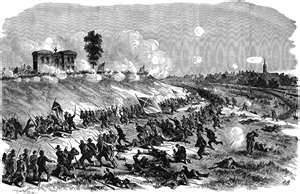Union General John Buford
John Buford was a Union general during the American Civil War. He is most well-known for enabling Union troops to seize the high ground at Gettysburg, a development that ultimately led to the Union victory there. He was born on March 4, 1825, in Woodford, Ky. When he was young, his family moved to Rock Island, Ill. 
Buford attended Knox College in nearby Galesburg for a time and then, in 1844, enrolled at the U.S. Military Academy. He graduated from West Point four years later with a commission as a second lieutenant. He had attained the rank of captain by the time the Civil War began and, in November 1861, was promoted to major, as part of the team in charge of the general defenses of Washington, D.C. In 1862, the Union army formed a new army, the Army of Virginia, with John Pope as its commander. Pope named Buford commander of the cavalry brigade of II Corps. In fighting in the Second Battle of Bull Run/Manassas, Buford sustained a knee injury, while holding off a Confederate counterattack long enough for the main army to escape. 
Buford remained head of the cavalry division of the Army of the Potomac through battles at Antietam and Fredericksburg, until the appointment of Joseph Hooker as commander of that army. Among Hooker's military reorganizations was the placement of Buford in charge of the reserve cavalry. The cavalry corps that Buford led supported a larger movement by Maj. Gen. Alfred Pleasanton against vaunted Confederate cavalry commander J.E.B. Stuart at Brandy Station on June 9, 1863. This was the largest cavalry clash of the entire war. On July 1, Buford and his men encountered a group of Confederate troops outside Buford followed that up by harassing Confederate troops in Virginia throughout the summer of 1863. Buford contracted typhoid fever in November of that year, and that is what killed him. He died on Dec. 16, 1863, in Washington, D.C.; he was 37. |
|
Social Studies for Kids
copyright 2002–2024
David White



 Gettysburg. Buford ordered his men to dismount and do whatever they could to prevent the Confederate advance. The cavalry's actions were enough to enable the infantry, under Maj. Gen. John Reynolds, to arrive and claim the high ground. Union troops occupied places like Culp's Hill and Cemetery Ridge and Little Round Top and, in desperate defensive actions, held that high ground in the face of fierce Confederate attacks during the
Gettysburg. Buford ordered his men to dismount and do whatever they could to prevent the Confederate advance. The cavalry's actions were enough to enable the infantry, under Maj. Gen. John Reynolds, to arrive and claim the high ground. Union troops occupied places like Culp's Hill and Cemetery Ridge and Little Round Top and, in desperate defensive actions, held that high ground in the face of fierce Confederate attacks during the 
